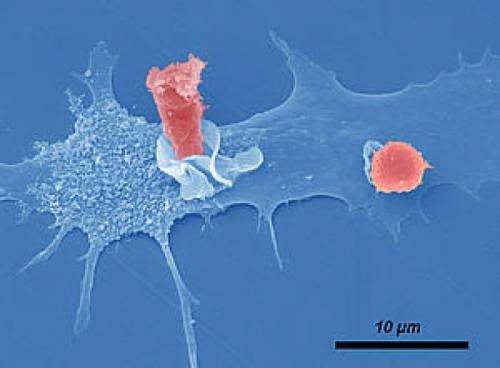Presence of common infection—cytomegalovirus—helps to explain increased other virus susceptibility in aging adults

(Medical Xpress)—The first experimental proof that long-term infection with cytomegalovirus, or CMV, may impair the aging immune system's response to unrelated viruses – such as West Nile or the flu – has been published in the journal PLoS Pathogens.
Most adults are infected with CMV, a member of the herpesvirus family, but the virus often causes few or no symptoms. Once infected, people harbor CMV for life but a healthy immune system keeps it at bay. However, in clinical studies, CMV has been associated with poor immune function in older adults, coinciding with poor responses to other viruses, to vaccines, or poor life expectancy.
"The cytomegalovirus, present in the majority of healthy older adults, indeed erodes the immune defense against new infections," said senior investigator Dr. Janko Nikolich-Zugich, chairman of the department of immunobiology, co-director of the Arizona Center on Aging and Elizabeth Bowman Professor in Medical Research at The University of Arizona College of Medicine-Tucson. Nikolich-Zugich also is a member of the UA BIO5 Institute.
Nikolich-Zugich started this work at the Oregon Health and Science University, Portland, Ore., with his team that was led by then-postdoctoral fellow assistant Dr. Luka Čiin-Šain, who now is assistant professor and head of the Immune Aging and Chronic Infections junior research group at the Helmholtz Centre for Infection Research in Braunschweig, Germany. Both scientists continued to study the long-term consequences of the ongoing presence of CMV in Tucson and Braunschweig, respectively.
Jennifer Uhrlaub, research associate with the UA department of immunobiology and the Arizona Center on Aging, also participated in the study.
They discovered that while over time more and more cells of the immune system – particularly the T cells, a type of white blood cell critical in the immune system's response to infection – concentrate on CMV, the T cells in charge of responding to other viruses were fewer in numbers and functionally impaired. Similar conclusions were reached by another group from Germany, led by Dr. Urs Karrer, and are published in the same issue of PloS Pathogens.
"The ongoing presence of CMV contributes to the defects of the aged immune system, helping to explain why older adults often are more prone to infectious diseases than young people," said Nikolich-Zugich. "Future studies will allow us to understand the effect of persisting CMV infections on immune responses, which particularly is important for the efficiency of vaccination strategies."
More information: Mekker A, Tchang VS, Haeberli L, Oxenius A, Trkola A, et al. (2012) Immune Senescence: Relative Contributions of Age and Cytomegalovirus Infection. PLoS Pathog 8(8): e1002850. doi:10.1371/journal.ppat.1002850
















